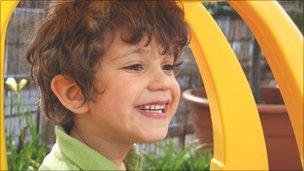Parents pledge six-figure sum to autism research centre
- Published

Kenz Alusi has fragile X syndrome, the main cause of inherited autism
A couple have pledged a six-figure sum to increase understanding of a little-known genetic condition that affects their son.
Gus Alusi and Reem Waines, whose son Kenz has fragile X syndrome, the main cause of inherited autism, are backing a new Edinburgh-based initiative.
The centre is to be the first of its kind in the UK and will bring together scientists and specialist doctors.
Between 12,000 and 15,000 people in the UK are affected by the syndrome.
The condition is caused by a genetic mutation and can result in severe learning disabilities and language impairment, sensory hypersensitivity and anxiety and hyperactivity.
The London-based family's gift will help researchers focus on understanding the brain processes that underlie the conditions with the hope of developing more effective treatment for patients.
The Patrick Wild Centre for Research into Autism, Fragile X Syndrome and Intellectual Disabilities will be based at Edinburgh University.
Gus and Reem said: "This centre is what we have been hoping for since our son was diagnosed with fragile X syndrome.
"Until now we have had to travel to the USA for specialist help with his condition, but this new centre will be a hub for UK patients and their families, so that they too can access the pioneering research that will ultimately transform the treatment of these diseases."
'Desperately needed'
The centre has also received support from Edinburgh University graduate Dr Alfred Wild, whose family was affected by autism.
The centre, named after Dr Wild's brother Patrick, is to build on an "already strong" research base at the university.
Dr Andrew Stanfield, one of the directors of the new centre, said: "There are very few effective therapies for autism and intellectual disabilities.
"Improved interventions are desperately needed.
"This new centre will enable scientists and clinicians to develop research to understand the fundamental origins of these conditions and translate these findings into advances in clinical practice.
"Although we are at a very early stage in this process, the potential is huge and it's an exciting time to be involved with this field."
The research will be carried out by scientists at different sites across Edinburgh in a "virtual" centre. It is hoped a building to house the centre will be built in the future.